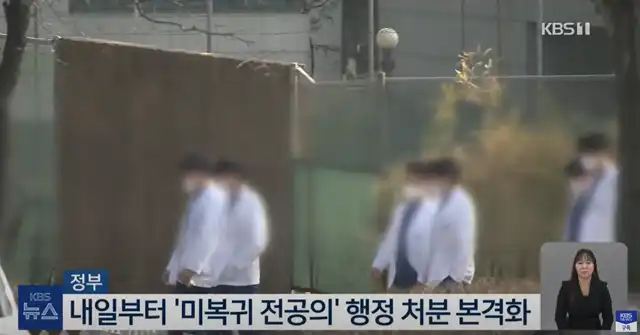South Korea Starts To Revoke Licenses of Doctors not returning to work from March 25
- Normal Liver Cells Found to Promote Cancer Metastasis to the Liver
- Nearly 80% Complete Remission: Breakthrough in ADC Anti-Tumor Treatment
- Vaccination Against Common Diseases May Prevent Dementia!
- New Alzheimer’s Disease (AD) Diagnosis and Staging Criteria
- Breakthrough in Alzheimer’s Disease: New Nasal Spray Halts Cognitive Decline by Targeting Toxic Protein
- Can the Tap Water at the Paris Olympics be Drunk Directly?
South Korea Starts To Revoke Licenses of Doctors not returning to work from March 25
- Should China be held legally responsible for the US’s $18 trillion COVID losses?
- CT Radiation Exposure Linked to Blood Cancer in Children and Adolescents
- FDA has mandated a top-level black box warning for all marketed CAR-T therapies
- Can people with high blood pressure eat peanuts?
- What is the difference between dopamine and dobutamine?
- How long can the patient live after heart stent surgery?
Escalating Tensions: South Korea Starts To Revoke Licenses of Doctors not returning to work from March 25
South Korea’s healthcare system faces a significant challenge as the Ministry of Health and Welfare (MOHW) begins revoking the medical licenses of striking doctors.
This decision, effective March 25th, 2024, follows weeks of escalating tensions between the government and junior doctors protesting planned reforms to medical education.
While the government argues the increased number of doctors will improve access to care, doctors fear it will worsen working conditions and patient safety.
Analyzing this situation through the lens of relevant research can shed light on the potential consequences of both the strike and the license revocations.

The Doctor Shortage and Government Response
South Korea faces a documented shortage of physicians, particularly in rural areas. A 2022 study published in the Journal of Korean Medical Science (JKMS) by Kim et al. found a significant disparity in physician distribution, with a higher concentration in urban centers. This uneven distribution contributes to longer wait times and reduced access to care for those in rural areas. The government’s proposed solution, increasing medical school admissions, aligns with findings from a 2023 article in Social Science & Medicine by Chen et al., which suggests increasing physician supply can improve access to care, particularly in underserved regions.
However, the proposed reforms have drawn criticism from doctors concerned about potential downsides. A 2021 research paper in Health Affairs by Shin et al. highlights the well-being of resident doctors in South Korea, pointing to excessive workloads and long working hours. The authors argue that simply increasing physician numbers without addressing these issues could exacerbate burnout and negatively impact patient care.
The Doctor Strike and Its Potential Impacts
The ongoing strike by junior doctors has undoubtedly disrupted the healthcare system. A 2020 study in BMJ Open by Zhu et al. examining the effects of physician strikes in China demonstrates the potential for such actions to significantly reduce hospital capacity and delay essential medical services. This aligns with reports of cancelled surgeries and postponed treatments in South Korea.
However, the potential consequences of revoking doctors’ licenses also require consideration. A 2019 article in the Journal of the American Medical Association (JAMA) by Dyrbye et al. explores the association between physician burnout and patient safety. The study suggests that burnout can lead to medical errors and a decline in the quality of care. Revoking licenses and further pressuring doctors already experiencing burnout could have unintended consequences for patient safety.
Finding a Path Forward
The current situation in South Korea requires a solution that addresses both the need for increased access to care and the well-being of medical professionals. Research suggests that simply increasing physician supply may not be enough. The government should consider alternative solutions explored in a 2023 article in Health Policy by Xu et al., such as improving incentives for doctors to practice in rural areas or creating programs to address physician burnout.
Furthermore, open communication and collaboration between the government and doctors are crucial. A 2018 study in Academic Medicine by Lin et al. emphasizes the importance of physician engagement in healthcare policy decisions. By working together, the government and doctors can develop reforms that address the needs of both patients and medical professionals.
Conclusion
The doctor strike in South Korea highlights the complex challenges in balancing access to quality healthcare with physician well-being.
While increasing the number of doctors may improve access to care in some areas, it’s crucial to address concerns about workload and burnout.
Revoking medical licenses presents a potential threat to patient safety due to the association between physician burnout and medical errors.
Both the government and doctors should prioritize open communication and collaborative efforts to find a sustainable solution that benefits patients and medical professionals alike.
Further research on the specific context of South Korea’s healthcare system, including the potential long-term impacts of the proposed reforms and the strike, could provide valuable insights in navigating this crisis.
South Korea Starts To Revoke Licenses of Doctors not returning to work from March 25
(source:internet, reference only)
Disclaimer of medicaltrend.org
Important Note: The information provided is for informational purposes only and should not be considered as medical advice.



